Uncategorized
Showing 241–252 of 343 results
-
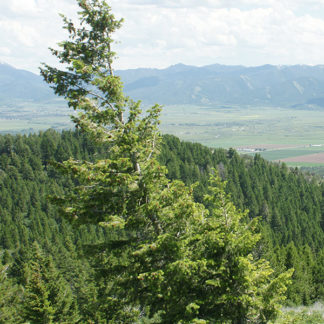
Picea engelmannii / Engelmann spruce
- common, especially in mixed conifer forests
- canopy a narrow spire in young trees, cylindrical in older trees
- sharp, pointy needles, generally "swept" toward branch tips
- needles attached to twigs with woody pegs (sterigmata)
- pendant cones less than 2.5 inches long; thin scales, wavy margins
-
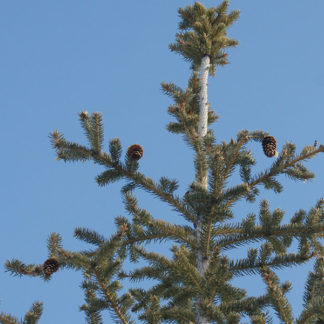
Picea pungens / Colorado blue spruce
- conical, layered crown; whorled branches
- frequent epicormic branches; "woolly" look
- stout, yellow-brown twigs with sterigmata (woody pegs)
- cones greater than 2.5" long
- cone scales stiff at base, diamond shaped, not wavy at tips
- in mixed conifer forests
-

Pinus albicaulis / whitebark pine
- high altitude - subalpine to alpine; cold, windy sites
- five needles in tight fasicles
- brown to purple cones at top of tree; cones don't open
- scaly grayish bark
-

Pinus contorta / lodgepole pine
- evergreen conifer
- needles in groups (fascicles) of 2
- lopsided cones, (mostly) remain on tree when mature
- rounded crown; orangey-brown scaly bark
-
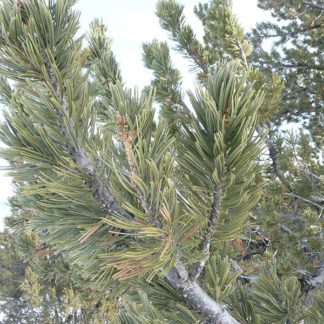
Pinus flexilis / limber pine
- high elevation, rocky or talus, dry, high-stress habitat
- often - stunted and deformed by wind
- highly flexible branches
- needles in bundles (fascicles) of 5
- often - semi-rotted cones on ground below
-
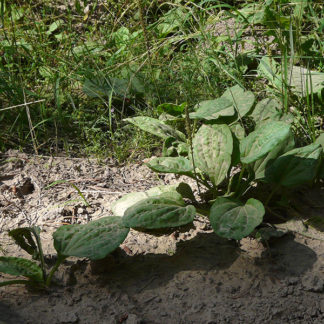
Plantago major / broadleaf plantain
-
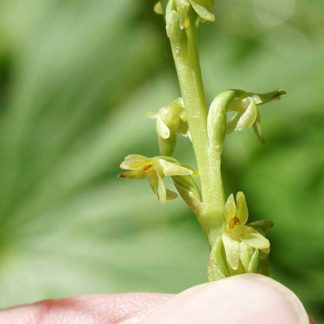
Plantanthera unalascensis / slender-spire orchid
- teeny, green flowers, well-separated, not spiraled
- a "tall, thin, green nothing"
- basal leaves prostrate, but not appressed to the ground
- leaves often wither before pollination occurs
- found in many different habitats
-

Platanthera dilatata / white bog orchid
- dense cluster of bright white, clove or cinnamon scented flowers
- 2 wing-like sepals, a hood, and a lower lip with a spur
- 3-6 principle leaves... alternate, lance-shaped
- in boggy wet areas
-
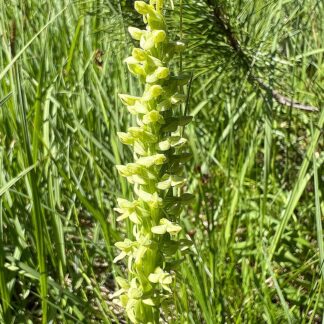
Platanthera huronensis / green bog orchid
- usually in bogs, fens, wetlands
- up to two feet tall, but often shorter
- thick, nearly vertical leaves with parallel veins (i.e. grass-like)
- up to 75 very small flowers per stem (raceme)
- flowers -light green to greenish-white; two petals, three sepals, a lip and club-like spur
- lip is not pouch-like
-

Poa bulbosa / bulbous meadow-grass
- short, tuft-forming grass
- funny-looking flower stalks... having bulblets instead of florets
- doesn't produce pollen or seeds
-

Polemonium occidentale / western Jacob’s ladder
- brilliantly blue flowers with bright yellow anthers, in clusters
- pinnately compound leaves with up to 27 narrow, lance-shaped leaflets
- most leaves on separate stems from the flowers
- usually in wetlands
-

Polygonum aviculare / prostrate knotweed
- long, prostrate stems around a central point
- copious red-edged white flowers
- small green leaves
- along roadsides, parking lots and wherever trampling occurs
- an ugly weed you'll see on most of your walks around town
Showing 241–252 of 343 results